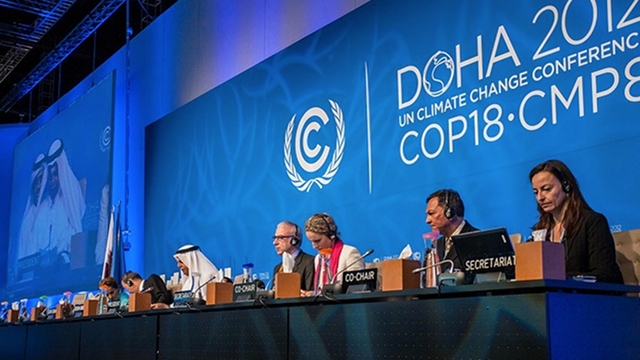SUMMARY
This is AI generated summarization, which may have errors. For context, always refer to the full article.

DOHA, Qatar – UN talks seeking to slow the destructive march of global warming spilled over into the early hours of Saturday, paralysed by a standoff between rich and poor nations on funding.
Negotiators huddled in corridors and meeting rooms overnight in a last-ditch effort to find consensus on an interim plan to rein in climate change and smooth the way to a new deal that must enter into force in 2020.
The main goal of the Doha meeting, which had been scheduled to close on Friday, is to extend the greenhouse gas-curbing Kyoto Protocol.
But the issue of funding to help poor countries deal with the fallout from global warming and convert to planet-friendlier energy sources complicated the haggling by envoys from nearly 200 countries gathered in the Qatari capital.
“We cannot close the (negotiations) without… finance,” Gambian negotiator Pa Ousman Jarju insisted on Friday.
Developed countries are being pressed to show how they intend to keep a promise to raise climate funding for poorer nations to $100 billion (76 billion euros) per year by 2020 — up from a total of $30 billion in 2010-2012.
Developing countries say they need at least another $60 billion between now and 2015 — starting with $20 billion from next year — to deal with a climate change-induced rise in droughts, floods, rising sea levels and storms.
But the United States and European Union have refused to put concrete figures on the table for 2013-2020 funding, citing tough financial times.
“The EU cannot accept a text that includes a commitment to $60 billion in public money in 2015 considering the budget constraints that we face,” French Development Minister Pascal Canfin told journalists late Friday.
Deadlock
There was also deadlock on a demand by least developed countries and those most at risk of sea level rise that provision be made for losses they suffer because of climate change — which they blame on the West’s polluting ways ever since the industrial era.
With no signs of progress, a sign went up in the conference media centre around 04.00 am (0100 GMT) to announce that a “presentation of outcomes and next steps towards closure” will be made at 07.30am.
NGOs and delegates have expressed frustration at the pace of negotiations that coincided with a slew of fresh scientific warnings that Earth faces a calamitous future of more frequent extreme weather events.
The UN is targeting a maximum temperature rise of two degrees Celsius (3.6 deg Fahrenheit) on pre-industrial levels that scientists believe will be manageable, but recent evidence warns the planet may be on the path to double that.
One of the key disputes in Doha was “hot air”, the name given to greenhouse gas emission quotas that countries were given under the first leg of the 1997 Kyoto Protocol and did not use — some 13 billion tonnes in total.
The credits can be sold to nations battling to meet their own quotas, meaning that greenhouse gas levels decrease on paper but not in the atmosphere.
Poland and Russia emitted much less than their lenient limits, and insisted in Doha on being allowed to bank the difference beyond 2012 — a move most other parties vehemently oppose.
Agreement on hot air is key to the Doha delegates extending the life of the Kyoto pact, whose first leg expires on December 31.
The protocol is the world’s only binding pact on curbing greenhouse gases, but it locks in only developed nations and excludes major developing polluters such as China and India, as well as the United States, which refused to ratify it.
A new 2020 deal, due to be finalised by 2015, will include commitments for all the nations of the world.
Success in Doha is seen as key to smoothing the way to a 2020 pact. – Agence France-Presse
Add a comment
How does this make you feel?
There are no comments yet. Add your comment to start the conversation.